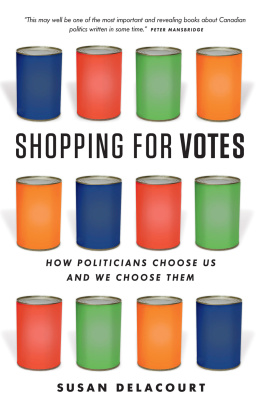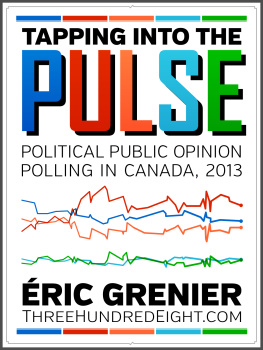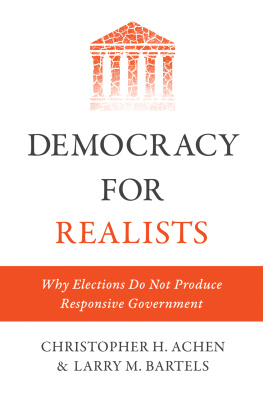

Market-Tested
A lmost as soon as Canadian political players fully embraced polling and advertising in the 1970s, earnest voices began to be raised in buyers regret. No question, people were having fun with all the new commercial tools for politicking, but what would they do to the higher calling of the profession? And so, for the next couple of decades, Canadian politicos seesawed between arguments over just how much our democratic system should be getting mixed up in the tools of the consumer marketplace. While that debate carried on, though, the country started to amass most of the raw ingredients of the all-out political marketing and consumer citizenship that would dominate the twenty-first century. Resistance would prove futile.
In the midst of the 1979 election campaign, a clearly grumpy Geoffrey Stevens lamented in his much-read Globe and Mail column how politics was turning into the Selling of the Canadian Politician, and in the process, untethering the voting public from the true, more civic-minded purpose of politics:
The 120-odd journalists who are travelling with Messrs. Trudeau, Clark and Broadbent today are less political reporters than they are stage props for the evening news. Dutifully, inanely, we follow Mr. Clark through the Syncrude project at Fort McMurray, Mr. Broadbent through a hospital in Regina, Mr. Trudeau through a boys and girls club in Saint John. Does Mr. Clark actually know anything more about the problems of small business than he did before he strode, rapidly, through a box company in Kitchener? Is Mr. Broadbents understanding of the complexities of food pricing deepened because he was able to pose in front of the produce counter at a co-op in St. Boniface? Is Mr. Trudeau more sensitive to the diversity of the Canadian soul because he lit a string of firecrackers on a street in Chinatown in Vancouver?
Stevens complained that campaigns had become a physical endurance test, rather than a challenge to inform and educate the citizenry. Somehow, he said, Canadian political journalists were helping to push the myth that if a politician could perform like an ad pitchman, he could also run a country: What nonsense. What rubbish. All thats being established is that the three leaders, properly briefed, are able to make painstakingly stage-managed public appearances without falling into the orchestra pit. We are learning nothing about which man would make the best prime minister or how he would conduct himself if entrusted with that high office. Even the earnest New Democrats were embracing the slick new tools of the political trade, setting aside an unprecedented $1 million for advertising in the 1979 campaign with leader Ed Broadbent.
Terry OMalley, ever upbeat, hauled out his Underwood typewriter and hammered out a defence of advertisings place in politics for the pages of the Globe and Mail : For me, advertising is one of the real bases of democracy. It is the voice of reporting on one of the most important fundamentals in our society: the goods and services supplied to the marketplace. He also dropped an interesting bit of advertising-industry intelligence. Apparently, the most disliked form of ads were ones for household products such as soap and deodorant. However, OMalley said, these were also the ads that proved to be most effective, simply because the soap and deodorant corporations had the money to saturate the airwaves.
There was a great bit of foreshadowing in OMalleys column for the politics to come three decades down the road in Canada, when a federal Conservative party learned that you could make Canadians watch ads they didnt like and still persuade them to buy your productas long as you had the resources to carry out a sustained PR effort. OMalley, with the help of that handy soap metaphor again, was spelling out the formula for the unlikely success of attack ads. It was as simple as this: you may not like them, but they will get in your head anyway, thanks to rote, repeated exposure.
What the Canadian political media was witnessing going into the 1980s, in fact, was just the tip of the iceberg. Or, as Canadian band Bachman-Turner Overdrive sang in the 1970s, you aint seen nothin yet. Advertising and marketing were not just shaping politics and election campaigns, but their influence was being felt in government too, in between elections. The ad gurus were starting to be consulted on what policies would be more attractive to the citizens and what measures would be more consumer-friendly. Need a program to fight inflation or hammer out a new constitutional deal? Dont call the political scientists. Call the ad guys.
There were also political developments unfolding on the world stage at the time, particularly in Britain and the United States, which would prove to be crucial lessons for future generations of Canadian politicos.
Have It Your Way
A lawyer and a staunch capitalist, Margaret Thatcher, daughter of a greengrocer, had assumed the helm of the British Conservative Party in 1975. Although she had been educated as a scientist, she began her political career in the 1950s as a young MP for the riding of Dartford, a community in England that had been hard hit by the rationing and regulation fervour of postwar Britain. Further political experience, notably as health minister in the early 1970s, had put Thatcher on a constant collision course with unions and state-run enterprise. Tough, hard as nails, Thatcher believed business-minded people were best-placed to handle affairs of state and political campaigning. Thatcher would seize every opportunity to link politics to shopping, charging through supermarkets with a grocery cart during election campaigns and urging voters to see government finances as a household budget. As she ascended to the prime ministers job in the late 1970s, pundits would call her Margaret the Marketed and her campaign The Selling of Maggie.
The Thatcher-led merger of politics and marketing began with a fateful decision to bring advertising experts right into the inner circle of political decision-making in the Conservative Party of Great Britain. Gordon Reece, a former television producer, had been working with Thatcher since 1970, coaching her on how to be more TV-friendly. Reece, almost immediately after his 1978 appointment as director of publicity for the new Conservative leader, sought out a high-flying British advertising firm, Saatchi & Saatchi, to do a total image makeover for the party. As Margaret Scammell wrote in her 1995 book Designer Politics: How Elections Are Won , the advertising firm was given a free hand to do for the party what it had done for its corporate clients:
The Saatchi team went to work on their new account much as they would any other; its first task was to research consumers emotional reaction to the product and then to reduce the clients objectives and most logical appeals to their simplest elements Saatchis stress on the general emotional appeal, rather than the particular policy aspects, led them to engage more heavily in qualitative, motivational research rather than quantitative surveys. Saatchi imported qualitative marketing research direct from the commercial world: unlike quantitative research, it does not attempt to produce statistically measurable results. It relies on focus-group discussion and in-depth interviews with voters in target groups. In the commercial field it is used widely at the stage of product development to gain an early indication of consumer reactions. In advertising, it is used frequently to test copy before it is released.
Next page








